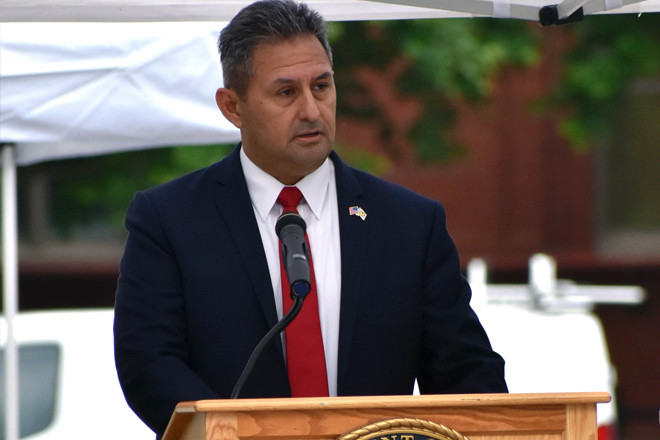The American Civil Liberties Union on Saturday filed a class-action lawsuit against the federal Bureau of Prisons and the Lompoc correctional complex for “mismanaging one of the worst public health catastrophes related to COVID-19 anywhere in the country,” the document claims. The filing names BOP director Michael Carvajal and Louis Milusnic, acting warden of the Lompoc complex, where more than 1,088 inmates and 39 staff have tested positive for the virus since it was first detected in late March. Two inmates have died.
“This crisis need never have reached such horrific proportions,” the American Civil Liberties Union (ACLU) said in a prepared statement. The organization is also suing the BOP’s Terminal Island facility, where eight inmates have died. “Through a series of unconscionable delays, blunders, and failures to follow official guidelines, the situation grew unimaginably worse. And still, Terminal Island and Lompoc prison officials refuse to take adequate remedial actions, including those approved by the U.S. Congress and Attorney General’s office.”
The lawsuit accuses federal officials of not enacting proper safety protocols, providing basic sanitary supplies like soap and hand sanitizer, or distributing sufficient personal protective equipment (PPE) to either inmates or staff. It also claims authorities did not conduct timely testing or do enough to isolate infected prisoners. These conditions allowed the virus to “spread like wildfire” within the close confines of the facilities, said the ACLU, which lodged the class-action Lompoc complaint on behalf of five inmates.
Yonnedil Torres is one of them. According to the ACLU, Torres, 24, suffers from chronic asthma. In the midst of the Lompoc outbreak, he developed fever, diarrhea, and body aches, but his requests for medical assistance went ignored for five days. Only after he collapsed in his cell with acute respiratory shock did the prison intervene. Torres was put into a medically induced coma and placed on a ventilator, but the ordeal left him with severe lung damage. On their most recent phone call, his sister could no longer recognize his voice.
“It’s not just a medical and humanitarian crisis,” the ACLU said in its statement, “but also a violation of the Eighth Amendment of the U.S. Constitution that protects against ‘cruel and unusual punishments.’” The organization cites original reporting by the Santa Barbara Independent as the basis for a number of its allegations.
“Prison officials’ deliberate indifference has endangered the lives of the thousands of people imprisoned in Terminal Island and Lompoc, including those who have high-risk health conditions,” said attorney Naeun Rim in a prepared comment. “Congress gave prisons broad authority to release low-risk offenders into home confinement so that it could reduce overcrowding and save lives. But officials failed to use that authority. We will hold them accountable in court.”
Reducing prison populations was one of the goals of the Coronavirus Aid, Relief, and Economic Security (CARES) Act signed into law on March 27, the ACLU noted. It gave prison officials broad discretion to allow petitions for home confinement. Attorney General William Barr also specifically urged the transfer of people with medical conditions.
“While the rest of California took extraordinary measures to stop the spread of coronavirus, the Bureau of Prisons failed to take preventive measures as basic as isolating sick prisoners, allowing social distancing, or providing enough soap,” said attorney Peter Bibring. “Their deliberate indifference to the risk of disease violates the constitution and puts both those in prison and the surrounding community at risk.”
The lawsuit also makes special mention of the restrictions on phones and email that Lompoc officials imposed on prisoners, ostensibly to slow the spread of the virus. “Petitioners have barely been able to access phones and internet to ask for help from their lawyers or family members,” the suit says. “State jails and most other federal facilities have not implemented similar restrictions on communication with the outside world, and in fact, some state jails are permitting free phone calls due to bans on in-person visiting.”
Lompoc inmate-plaintiff Andre Brown, 55, has learning disabilities and is illiterate, the filing goes on to explain. The communications blackout has functionally cut him off from the outside world. Brown has prostate cancer and asthma, and while he has petitioned for compassionate release, he has not received a response.
The same goes for inmate-plaintiff Felix Samuel Garcia, 36, who is scheduled to be transferred to a halfway house on July 7, 2020, and then released from custody on November 6. He petitioned for home confinement but never received a response. “Staff have not been accepting the forms required to initiate the process, claiming they cannot do so due to the exigency of the COVID-19 pandemic,” the ACLU said.
Instead, Garcia is now housed in a makeshift cell block set up in a prison warehouse. He’s locked down nearly 24 hours a day and not allowed to shower or change clothes. He’s using a sink to wet his body in an attempt to stay clean, the lawsuit claims.
This article was underwritten in part by the Mickey Flacks Journalism Fund for Social Justice, a proud, innovative supporter of local news. To make a contribution go to sbcan.org/journalism_fund.

